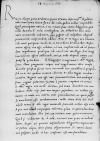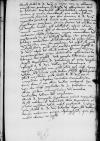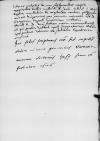 BCz, 1597, p. 1231
BCz, 1597, p. 1231
Reverendissime in Christo Pater et Domine, frater et amice observatissime.
Redditae mihi sunt ⌊⌋ Reverendissimae Dominationis Vestrae, quibus ordine respondebo.
Quod ⌊proscriptum⌋ attinet, a me curata sunt omnia diligenter, quae velle Reverendissimam Dominationem Vestram intelligebam.
De abbatibus alia mihi ratio invenienda videretur, qua posset ad subsidium aliquod pecuniarium conferendum adduci. Nam s(acra) or s(erenissima)⌈s(acra)s(acra) or s(erenissima)⌉ ⌊maiestas regia⌋ non libenter sibi iuris quicquam vindicat in sacerdotes et monachos. Nostri autem officii non esse videtur, ut eam consiliis nostris ad id faciendum impellamus, quod ipsa sibi non licere intelligit. Aut itaque benevolentia essent adducendi, aut ex ⌊urbe⌋ aliquid contra eos praesidii petendum.
⌊Elbingenses⌋ scripserunt s(acrae) or s(erenissimae)⌈s(acrae)s(acrae) or s(erenissimae)⌉ ⌊maiestati regiae⌋ suum ⌊illum⌋ purgantes atque una supplicantes, ut ei causae dicendae potestas fieret, neve non modo non convictus a quoquam, sed ne in ius quidem vocatus decreto s(acrae) or s(erenissimae)⌈s(acrae)s(acrae) or s(erenissimae)⌉ maiestatis regiae condemnaretur. Negant ⌊eum⌋ esse aut sacramentarium, aut anabaptistam, negant extorrem factum a patria. Cupiunt, ut coram s(acra) or s(erenissima)⌈s(acra)s(acra) or s(erenissima)⌉ ⌊maiestate regia⌋ non modo dicatur, sed etiam doceatur ita rem habere. Mihi visi sunt non iniqua postulare ac rectius putarem, ut iuris via contra ⌊eum⌋ procederetur, ne queri posset se inauditum esse condemnatum, nulla etiam dicta die, sed nihilominus s(acrae) or s(erenissimae)⌈s(acrae)s(acrae) or s(erenissimae)⌉ ⌊maiestati regiae⌋ mutandae sententiae auctor esse nolui. A ⌊qua⌋ non aliud responsum tulerunt, quam ut quemadmodum ante mandatum illis fuit, ex ⌊civitate⌋ eum exterminarent. Quod si videretur Reverendissimae Dominationi Vestrae, vocaret ⌊eum⌋ prius in iudicium suum deque iis, quorum insimulatur diligentius inquireret, ut saltem aliqua iuris forma observaretur. Si cetera doceri non possent, modo ut hoc constaret esse eum sacerdotem  BCz, 1597, p. 1232 coniugatum, esset satis iusta causa, cur ⌊eum⌋ proscribi oporteret. Sed inauditum condemnari durius est revera.
BCz, 1597, p. 1232 coniugatum, esset satis iusta causa, cur ⌊eum⌋ proscribi oporteret. Sed inauditum condemnari durius est revera.
Quod providit Reverendissima Dominatio Vestra, ut litterae s(acrae) or s(erenissimae)⌈s(acrae)s(acrae) or s(erenissimae)⌉ ⌊maiestatis regiae⌋ distribuerentur iis, quibus inscriptae sunt, ago gratias.
Quae ⌊⌋ ad me Reverendissima Dominatio Vestra de adiciendis nonnullis ad legationem, ea non legi quidem s(acrae) or s(erenissimae)⌈s(acrae)s(acrae) or s(erenissimae)⌉ ⌊maiestati regiae⌋, quod semotis arbitris fieri id a me non potuit, sed communicavi tamen cum illa summam eorum, quae Reverendissima Dominatio Vestra scripserat, ac ascribi iussit ad eum modum, ut videbit Reverendissima Dominatio Vestra. Cui exemplum mitto. Porro meum est consilium, ut legati aliqui ad s(acram) or s(erenissimam)⌈s(acram)s(acram) or s(erenissimam)⌉ ⌊maiestatem regiam⌋ designentur vel ex his, vel ex proxime insequentibus ⌊comitiis⌋, qui ad ⌊Regni comitia⌋ veniant, ac semotis arbitris audiri se postulent, et tum demum petant ea, si quae nondum erunt ex sententia ⌊dominorum consiliariorum⌋ confecta, et uni ex officialibus eorum expeditionem committi rogent. Quod si mihi provinciam hanc mandari volent, fidem in me et studium requiri non patiar. Mandata, quae postulat Reverendissima Dominatio Vestra, mitto. De rebus novis mecum communicatis ago gratias, quamvis ea ipsa ante mensem fere fuerint huc allata ab aliis.
Cupio Vestram ReverendissimaAm Dominationem bene valere. Cui me quam diligentissime commendo.
⌊Vilnae⌋, XXI-a Aprilis anno Domini M-o D-o XLI-o.
Postscript No. 1:
 BCz, 1597, p. 1233
BCz, 1597, p. 1233
Quod scribit Reverendissima Dominatio Vestra in meam, non in alterius cuiusquam gratiam se fecisse, ut offensarum magnifici domini ⌊palatini Brestensis⌋ oblivisceretur atque ex animo ei omnia remitteret, quae contra illam commissa fuerunt, ago hoc nomine Reverendissimae Dominationi Vestrae ingentes gratias. Cuius certe animum erga me singularem perspicio. Omnia faciam, ut eundem in se vicissim meum esse intelligat, atque alacri animo amoris hoc et benevolentiae cum illa certamen susp suscipiam, neque committam, ut posteriores in eo tulisse videar, ac quantum potero, contendam et elaborabo, ut quam telam exorsus sum, eam ita perficiam, ut nihil sit, quod moleste ferre, quod non gaudere potius possit Reverendissima Dominatio Vestra, atque ut illud potius honore invicem praevenientes, quam contumelia afficientes, de utroque dici possit. Vidi exempla litterarum, quas ⌊⌋ magnificus dominus ⌊palatinus⌋ et quas vicissim ⌊⌋ Reverendissima Dominatio Vestra. Vellem ipse utrarumque exempla scripsisse, non quod plus ipse mihi sapere videar, sed minus certe datum fuisset affectionibus. Illud me solatur, quod scribit Reverendissima Dominatio Vestra per se mansuram integram amicitiae coniunctionem hanc, etiam si per illum violari contigerit. Ego vero ita mihi persuadeo de domino ⌊palatino⌋, ne illum quidem commissurum, ut amicitiae violandae ullam det occasionem.
Quod domino ⌊praeposito⌋ legationis munus imponitur, id fit arbitrio et voluntate ⌊maiestatis reginalis⌋, cui si quis resistere velit, nihil profecerit. Cetera, quae scribit Reverendissima Dominatio Vestra, dolenter legi, sed vellem tamen, rationem quoque ascripsisset, qua his malis obviam iri possit.
 BCz, 1597, p. 1231
BCz, 1597, p. 1231
Quod attinet reservationem Cracoviensis episcopatus, quid ea in re monstri alatur, certi nihil habeo, sed scripsit tamen ad me dominus ⌊archiepiscopus⌋ se in reservatione hac meum potius quam suum commodum spectare, quod non alia re meis rationibus prospici possit melius. Sed ego metuo, ne suam rem agat potius, me spe alat, ne quid impediam. Impediendi autem difficilis est ratio, his praesertim temporibus, quibus multa facit s(acra) or s(erenissima)⌈s(acra)s(acra) or s(erenissima)⌉ ⌊maiestas regia⌋ contra voluntatem suam. Exitus indicabit, quid sit deinceps futurum. Quamlibet autem tenuis est adhuc fortuna ista mea, ego tamen numquam add written over h⌈hdd written over h⌉ucar, ut indignas aliquas condiciones accipiam, quibus haec mea tenuitas sublevari possit. Prior est apud me dignitatis et publicae quam privatae utilitatis ratio. Dum nihil contra dignitatem meam, nihil contra receptos mores, nihil agam contra publicum commodum. De fortunarum mearum accessione Deus viderit. Cui me commendo.
De gratitudine ⌊dominorum consiliariorum⌋ quae scribit Reverendissima Dominatio Vestra, grata mihi quidem sunt, sed ego tamen merita mea nulla agnosco, nisi forte inter merita numeratur summa benemerendi voluntas, quae mihi neque defuit umquam, neque in posterum est defutura. Cuius mei animi clara semper documenta dabo, quoties res postulaverit. Intelligo auctorem huius rei esse Reverendissimam Dominationem Vestram, ipsius ductu atque auspiciis ista geri. Illi imprimis debebo, si quid, vel potius quicquid, erit in me liberalitatis collatum. Deinde de gratia referenda aliis quoque tam publice, quam privatim semper ero sollicitus.
 BCz, 1597, p. 1235
BCz, 1597, p. 1235
Litteras patentes de non suscipiendis neque exsequendis bullis mitto Reverendissimae Dominationi Vestrae, sed et s(acrae) or s(erenissimae)⌈s(acrae)s(acrae) or s(erenissimae)⌉ ⌊maiestatis regiae⌋ mandatum de arrestandis centum quinquaginta aureis Hungaricis per primum nuntium ad dominum ⌊Georgium Hegel⌋ ⌊Cracoviam⌋ mittetur. Quod Reverendissima Dominatio Vestra ⌊fratrem meum⌋ commendavit iis, qui gratia valent apud ⌊imperatoriam maiestatem⌋, ago gratias. Utinam ex sententia legationem conficiat.
Hoc solus scripturus eram, sed capitis dolore nimio gravatus vicaria manu doctoris ⌊Hosii⌋ sum confidenter usus.
Postscript No. 2:
 BCz, 1597, p. 1237
BCz, 1597, p. 1237
Ad reverendissimum ⌊dominum Culmensem⌋ litteras, ut scripsi in litteris Reverendissimae Dominationi Vestrae, in manus eius superinscribed⌈eiuseius superinscribed⌉ non mitto, sed eas ei potius dandas existimavi, quem huc certarum rerum conficiendarum causa miserat.
 BCz, 1597, p. 1232 coniugatum, esset satis iusta causa, cur
BCz, 1597, p. 1232 coniugatum, esset satis iusta causa, cur 





